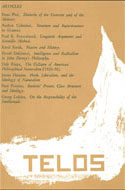The video of the fifth webinar in the Telos-Paul Piccone Institute’s Israel initiative is now available and can be viewed here. Titled “Our Troubled Institutions: The End(s) of Higher Education, Post-Journalism, and Antisemitism after October 7,” the panel featured Russell A. Berman, Gadi Taub, and Paulina Neuding, and their conversation was moderated by Israel initiative director Gabriel Noah Brahm.
The next webinar in the Israel webinar series will take place on June 7.
Continue reading →
By Telos Press · Tuesday, January 18, 2022 The second Telos Student Seminar will pair an essay by Huimin Jin, “Cultural Self-Confidence and Constellated Community: An Extended Discussion of Some Speeches by Xi Jinping” (Telos 195, Summer 2021, pp. 93–113), with an excerpt from Cornelius Castoriadis, “The Crisis of Western Societies” (Telos 53, Fall 1982, pp. 17–28). Our virtual gathering will feature Prof. Jin, who will be joining us from China, as well as a scholar representing the views of Castoriadis.
Modeled on the study groups from which Telos first grew, yet reconceived for the digital age, the Telos Student Seminars (TSS) provide a forum for students around the world to engage with critical theory by discussing a common set of paired texts from Telos—one current essay, and one pertinent essay from our archives—to connect the past and present of the journal to its future. TSS also provides an opportunity for students to be published on TELOSscope.
We seek teachers and scholars from around the world under whose aegis TSS groups can meet and who can provide students with intellectual encouragement and support. An institutional library subscription is necessary. Would you like to join us? Contact tss@telospress.com.
For more information about the Telos Student Seminars, click here.
Continue reading →
By David Pan and Mark S. Weiner · Monday, September 13, 2021 In anticipation of our two-hundredth issue, the editorial board of Telos is organizing an exciting new international initiative: the Telos Student Seminars (TSS). We are reaching out to you as a valued friend of the journal in the hope that you will be a part of our efforts.
Modeled on the study groups from which Telos first grew, yet reconceived for the digital age, the Telos Student Seminars will provide a forum for students around the world to engage with critical theory by discussing a common set of paired texts from Telos—one current essay, and one pertinent essay from our archives—guided by questions drawn up by our student interns and our editorial board. These questions will seek to connect the past and present of the journal to its future.
We seek faculty from around the world under whose aegis TSS groups can meet and who can provide students with intellectual encouragement and support. These friends of Telos will be designated as our Seminar Conveners. We would be thrilled if you would serve in this special capacity. Conveners are responsible for ensuring that their institutions have a subscription to Telos and its backfile so that students can participate—they can do so by contacting their university librarians.
Continue reading →
By Telos Press · Thursday, May 22, 2014 Telos Press is pleased to announce the 2014 Telos student essay competition, inviting graduate students and post-graduate researchers in the humanities to tell the world about their work. The competition offers young scholars the opportunity to be published in one of the leading international interdisciplinary journals. The deadline for submissions is August 1, 2014. For complete information about submitting your paper, click here.
Continue reading →
By Matt Applegate · Thursday, March 13, 2014 As an occasional feature on TELOSscope, we highlight a past Telos article whose critical insights continue to illuminate our thinking and challenge our assumptions. Today, Matt Applegate looks at Paul Piccone’s “Students’ Protest, Class-Structure, and Ideology” from Telos 3 (Spring 1969).
 Paul Piccone’s 1969 essay “Students’ Protest, Class-Structure, and Ideology” captures the revolutionary ethos of that time in the United States. Hippies, student politics, Black Power, as well as the work of such figures as Régis Debray and Herbert Marcuse all come under Piccone’s earnest critical consideration. His primary concern, however, is the link between these student revolts and the state of education in the United States. On the one hand, Piccone is intent on charting the means by which hyper-industrialization and the technologization of work lead to open student rebellion. On the other, he is interested in understanding why student rebellion is effective in relation to other forms of revolutionary organization that appear alongside it. Paul Piccone’s 1969 essay “Students’ Protest, Class-Structure, and Ideology” captures the revolutionary ethos of that time in the United States. Hippies, student politics, Black Power, as well as the work of such figures as Régis Debray and Herbert Marcuse all come under Piccone’s earnest critical consideration. His primary concern, however, is the link between these student revolts and the state of education in the United States. On the one hand, Piccone is intent on charting the means by which hyper-industrialization and the technologization of work lead to open student rebellion. On the other, he is interested in understanding why student rebellion is effective in relation to other forms of revolutionary organization that appear alongside it.
Continue reading →
|
|
 Paul Piccone’s 1969 essay
Paul Piccone’s 1969 essay 

